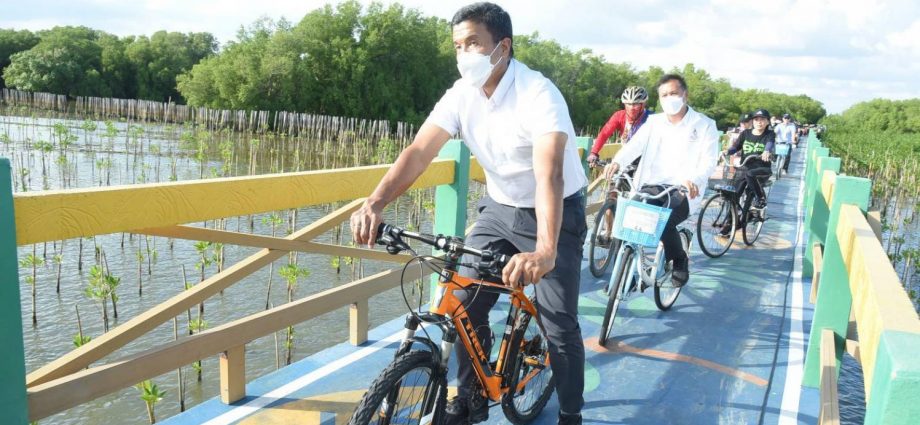Special report: Bang Khun Thian locals gird against climate change by helping conserve forests

Already suffering from severe coastal erosion and tidal floods, coastal communities such as Bang Khun Thian district are pursuing an eco-tourism development campaign as a way to counter these threats from climate change.
Bang Khun Thian is the most at-risk area of the capital to experience impacts of climate change, especially from rising sea levels and powerful storms, due to its location on low-lying swampy land in southwestern Bangkok.
However, with the community-led endeavour to promote eco-tourism and conserve local mangrove forests, citizens can be more resilient and better prepared for upcoming challenges.
Struggling to survive
Bang Khun Thian district boasts of being Bangkok’s only seaside district and is well known for its fresh seafood, but at the same time it is also one of the most rural and sparsely populated areas of the capital, due to its swampy terrain and remoteness from the city centre.
Many parts of the district, especially coastal areas near the sea, have been converted into large-scale fish and shrimp farms. Most locals live in small fishing villages that dot the coast and inner waterways.
However, the relatively peaceful and stable livelihoods of people here are being threatened by shoreline erosion and frequent flooding.
Sopin Jindachom, a resident of Tha Kham subdistrict, says her hometown is facing imminent danger from being permanently drawn under rising waves.
“For the residents of Bang Khun Thian district, the climate crisis is not just a faraway threat. Climate disasters are our reality for many years now, as storms and rising sea levels are eroding the shoreline and causing coastal floods, which damage the properties and livelihoods of locals,” Ms Sopin said.
“The ground beneath our feet is less than a metre above mean sea-level. So, even a small rise in the sea level means doom. We are truly a community at the front line of climate change.”
She said Bang Khun Thian district has lost about 3,000 rai of land to the sea over the past 30 years.
She has noticed the rising sea level is causing more frequent coastal flooding from high tidal surges, which normally occurred once a year during the annual peak spring tide in November, but now occur as often as twice a month, as normal spring tides can now trigger extensive coastal floods.
The trends are confirmed by a World Bank report on the impacts of rising sea levels in Thailand. It said while the average rate of global mean sea level rise is 3 millimetres per year, the relative range of sea level rise in the Gulf of Thailand progressed at a much higher rate of up to 12.7 millimetres per year between 1985 and 2009.
Securing climate resilience
Ms Sopin said citizens are pushing a plan to promote eco-tourism by developing a new 8-kilometre scenic cycling route along the Bang Khun Thian coastline and mangrove forest, to help mitigate these changes.
Ms Sopin, one of the project designers, said the idea is to raise public awareness of the problems of rising sea levels and coastal erosion and advocate for conservation of mangrove forests and local marine ecosystems through eco-tourism.
She said the loss of mangrove forest, which acts as a natural barrier against storms and coastal erosion, is also another major factor contributing to the problem.
She said the shoreline used to be covered with dense mangrove forest and the area teemed with rich aquatic life and fishery resources, but the boom in shrimp farming during the 1980s led to extensive clearing of mangrove forest to make way for shrimp farms.
Ms Sopin said the loss of mangrove forest is also affecting the health of marine ecosystems that both aquaculture and the fisheries sector rely on, leading to depletion of fisheries production, because the mangroves act as natural nursery grounds for many aquatic species.
“We also hope that this project will create additional income from tourism for locals and allow communities to minimise climate change impacts,” she said.
Help still needed
Karn Nikrosahakiat, another climate activist in Bang Khun Thian district, said the community-led initiative to promote eco-tourism shows local people can play a role in efforts to foster urban climate resilience.
“The local communities, especially the poor and marginalised groups, are often the most at-risk to the impacts of climate change. But even they are capable of finding climate solutions most suitable to their neighbourhood,” Mr Karn said.
“This is just the beginning of a local campaign to build urban climate resilience. People still need more help from authorities, academics, and international agencies, especially on climate knowledge and community empowerment.” He also hopes others will be inspired by their example.

